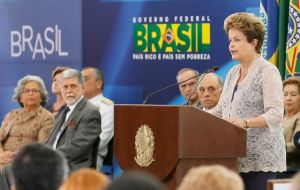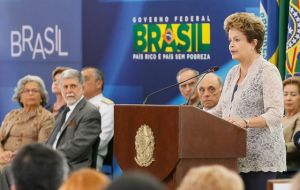MercoPress. South Atlantic News Agency
Rousseff begins second term promising economic recovery and anti-corruption crusade
 The president addressed Congress with pledges to curb inflation, pull Brazil out of the slump, and calls to a national pact to combat corruption
The president addressed Congress with pledges to curb inflation, pull Brazil out of the slump, and calls to a national pact to combat corruption  Dilma on the presidential Rolls Royce en route to the Planalto Palace to take the oath of her new cabinet of 39 ministers
Dilma on the presidential Rolls Royce en route to the Planalto Palace to take the oath of her new cabinet of 39 ministers Brazil’s President, Dilma Rousseff, 67, began her second term Thursday, January first vowing to rein in government spending to curb inflation and pull Latin America’s largest economy out of a four-year slump.
As she took the oath of office in Brasilia, Ms. Rousseff also promised to embark on an anti-corruption crusade in response to a multibillion-dollar graft scandal engulfing state-run oil company Petrobras that threatens to haunt her second term.
“More than anybody, I know Brazil needs to resume growth. The first steps of this journey are an overhaul of public accounts, increasing domestic savings, beefing up investments and improving productivity,” she said in her inaugural address to Congress.
She promised to undertake the belt-tightening in a way that minimizes the pain for average Brazilians who rely on the government for social welfare benefits.
A career bureaucrat who had never run for public office before becoming the first woman to ascend to Brazil’s presidency in 2011, Ms. Rousseff spent the past four years juggling an economic downturn and high inflation. She was narrowly re-elected in October after a divisive campaign.
To spearhead the change in economic policy, she previously named banker Joaquim Levy as finance minister. An orthodox economist who holds a doctorate from the University of Chicago, Mr. Levy is expected to enact budget cuts and other austerity measures to rebalance public accounts.
Those cuts, however, are likely to complicate what is expected to be another tough year for Brazil’s economy, given sluggish growth worldwide and a domestic marketplace increasingly accustomed to government largesse.
“It’s going to be a very rough year for her,” said former Congressman Alfredo Sirkis, a long-time critic of Ms. Rousseff, citing an “explosive combination” of problems.
Things will become even more complicated for Ms. Rousseff in February when the Supreme Court is expected to reveal the names of dozens of politicians who allegedly received funds from more than 3 billion dollars in kickbacks skimmed from the coffers of Petrobras, the country's main corporation and supposedly the pride of the country's crusade to ensure energy self sufficiency.
So far, 39 people have been arrested, including two former Petrobras directors and scores of executives from Brazil’s top construction companies. The construction executives are charged with channelling money from overpriced contracts to bribe officials and politicians.
Ms. Rousseff, who was chairwoman of Petrobras when much of the graft took place, has denied knowledge of the corruption.
On Thursday, she pledged to send Congress an anti-corruption bill in the first half of the year and engage legislators in what she described as a “national pact against corruption.”
“We have to create mechanisms so that this never happens again,” Rousseff said.
Meanwhile, she faces more trouble managing the unwieldy, multiparty coalition that helps her ruling Workers' Party govern.
Eduardo Cunha, one of her most outspoken critics and a Congressman from the notoriously demanding allies of the PMDB party, is expected to become speaker of the Lower House. Cunha has said he will convene a new Congressional committee to probe the Petrobras scandal, which could slow the president's legislative agenda.




Top Comments
Disclaimer & comment rules-

-

-

Read all commentsSame shit different day from the PT party, Brazil in for a shocking year
Jan 03rd, 2015 - 01:18 pm 0Dilma must have begged a lot to get a US State visit ater she hysterically canceled the last one.
Jan 03rd, 2015 - 01:23 pm 0She must be in dire straights to come on her knees to beg us for a FTA.
Make no mistake that is exactly why she's here.
DumbAssDilma's speech can be condensed as:
Jan 03rd, 2015 - 04:26 pm 0“I know I fucked up the first time around but I'll try not to do it again: honest.”
THAT would have been more honest than all the claptrap she came out with.
Commenting for this story is now closed.
If you have a Facebook account, become a fan and comment on our Facebook Page!